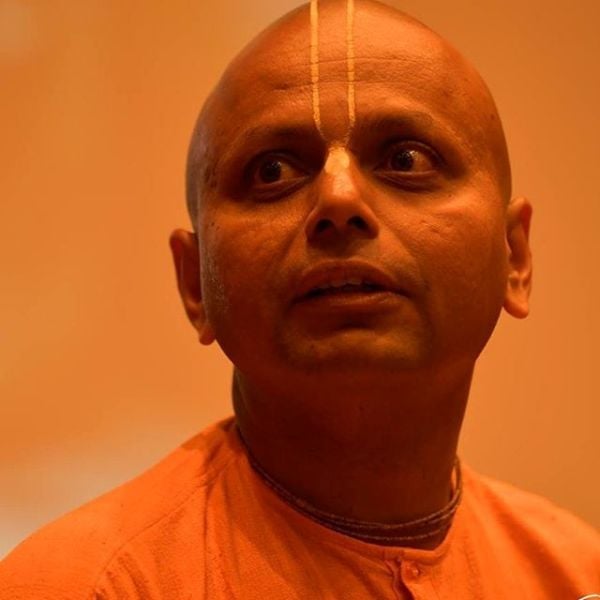
| Bio/Wiki | |
|---|---|
| Birth name | Asumal Sirumalani, Asumal Sirumalani Harpalani [1]OneIndia [2]DNA India |
| Nickname(s) | Bapuji |
| Profession | Religious and Spiritual Leader |
| Physical Stats & More | |
| Eye Colour | Black |
| Hair Colour | Salt & Pepper |
| Personal Life | |
| Date of Birth | 17 April 1941 (Thursday) |
| Age (as of 2023) | 82 Years |
| Birthplace | Berani village, Shaheed Benazir Abad District (Nawabshah), Sindh, British India (present-day Berani town is located in Jam Nawaz Ali Tehsil of Sanghar district, Sindh, Pakistan) |
| Zodiac sign | Aries |
| Nationality | Indian |
| Hometown | Maninagar, Ahmedabad, Gujarat, India |
| School | Jai Hind High School, Ahmedabad |
| College/University | Did Not Attend |
| Educational Qualification | 3rd Standard [3]The Indian Express |
| Religion | Hinduism |
| Caste | Bania [4]The Caravan |
| Food Habit | According to Rahul K Sachan, a former disciple and once personal assistant of Asaram, the food habit of Asaram is non-vegetarian. [5]The Indian Express |
| Address | Sant Shri Asharamji Bapu Ashram, Motera, Sabarmati, Ahmedabad (Before his arrest in 2013) |
| Hobbies | Dancing, Doing Make-up |
| Controversies | • In 1959, his name surfaced in a murder case, which he allegedly did under the influence of alcohol but was bailed due to lack of evidence. [6]OneIndia
• In 2000, locals at Bhairavi village of Navsari district filed a complaint against him for encroaching 6 acres of land in addition to 10 acres of the area allocated by the Gujarat Government. [7]The Indian Express • In 2001, after a Satsang (spiritual discourse), the Yoga Vedanta Samiti of his Ashram didn’t vacate the premises (100 acres valued at over Rs. 7 billion) of the Mangalya Temple, Madhya Pradesh. [8]India TV News • In 2002, his followers forged all the land of a Rajokri-based devotee Bhagwani Devi after convincing her to donate some part of her property to the Asharam’s trust. [9]Aaj Tak • In 2008, after the mysterious death of four boys at Motera Ashram (Ahmedabad), the local public filed an allegation against him for practicing black magic there and protested him strongly. [10]India TV • In Bhilwara (Mewar, Rajasthan), once the Nashik Municipal Corporation destroyed some part of his ashram for illegal possession of the Government land. [11]First Post • Once, the Bihar State Religious Trust in Patna filed a court case against his Asharam for grabbing a piece of land. [12]The Times of India • On 8 January 2010, his illegal possession of 67,059 square metres of land in the of land in the Ahmedabad ashram was taken over by the Gujarat Government. [13]The Indian Express • Once, his disciples Satya Narayan Dhoot and Bhanwar Lal Soni filed a court case against him for encroaching their lands in Rajasthan. [14]The Times of India • In September 2012, he was backlashed for slapping a video journalist during his discourse in Ghaziabad. [15]India TV • In May 2013, the Municipal Corporation of Cuttack demolished his ashram, which was illegally built there. • In September 2013, the father of the sexually assaulted girl by Asaram; submitted the audio clippings of the death threats made by his followers against him, to the court. [16]India Today • In September 2013, a illegal encroachment by Asaram’s ashram in Nashik was removed by The Nashik Municipal Corporation. [17]India Today • In 2014, the local authorities demolished an illegally built ashram of Asaram in Chowkitaal in Bhedhaghat. [18]News18 • On 11 January 2015, Asaram was accused for murdering Akhil Gupta, who was the prime witness of the Surat rape case. [19]The Wire • On 25 April 2018, a Jodhpur Schedule Caste and Schedule Tribe Court sentenced Asaram to life imprisonment, and the other two accused (Shilpi and Sharad) were sentenced to 20-years for raping a 16-year-old girl from Shahajahanpur, Uttar Pradesh. Judge Madhusudan Sharma pronounced the verdict inside the Jodhpur Central Jail. [20]India TV • In 2020, the Samba district administration demolished an illegally constructed Asaram’s ashram at at Raie village in Ghagwal area of Samba district. [21]The Tribune • On 30 January 2023, a local court in Gandhinagar, Gujarat, convicted him of rape. However, his son Narayan Sai, his wife Lakshmi, daughter Bharti, and four female followers, who were also accused in the case, were acquitted by the court. 10 years ago, a woman from Surat accused him of repeatedly raping her when she visited his ashram in Ahmedabad. [22]The Hindu On 31 January 2023, Gandhinagar sessions court sentenced him to life imprisonment in connection with this 2013 rape case and also imposed a fine of Rs. 50,000 on him. [23]The Hindu • On 1 May 2023, the Rajasthan High Court granted him bail in connection with presenting false documents in the Supreme Court; however, he could not come out of jail as he was convicted in other cases. [24]Aaj Tak |
| Relationships & More | |
| Marital Status | Married |
| Family | |
| Wife/Spouse | Laxmi Devi (Spiritual Leader) |
| Children | Son– Narayan Prem Sai (Religious Leader) Daughter– Bharati Devi (Religious Preacher) |
| Parents | Father– Thaumal Sirumalani (Businessman; Owned a coal and wood selling business) Mother– Mehangiba (Homemaker) |
| Money Factor | |
| Net Worth (approx.) | Rs. 10,000 crore (as of 2014) [25]IB Times |

Some Lesser Known Facts About Asaram Bapu
- In the late 1960s, Asaram Bapu emerged as a renowned religious and spiritual leader hailing from India, gaining significant attention as a godman.
- was born into a middle-class family in the Sindh region of British India. Following India’s partition in 1947, his family left behind all their immovable possessions in Sindh and relocated to Maninagar in Ahmedabad, which was then a part of the former Bombay State in India. Asaram Bapu spent his childhood in this new environment.
- At the age of 10, Asaram’s father, who operated a small business selling coal and wood in Ahmedabad, passed away.
- Following his father’s passing, Asaram assumed responsibility for his father’s business. Eventually, he relocated to Vijapur, a city situated in the Mehsana district of Gujarat.
- Asaram fled his home and sought refuge in an ashram in Bharuch at the tender age of 15, a mere 8 days prior to his scheduled marriage with Laxmi Devi. Nevertheless, his family managed to persuade him to come back home and fulfill his marital vows with Laxmi.
- At the age of 23, he once more fled his home and settled in Nanital. During his journey to Nanital, he encountered a revered spiritual leader called Lilashah at an ashram.
- Upon learning of Asaram’s departure from his home, Lilashah urged him to return. Following her guidance, Asaram returned to Ahmedabad. However, after thirteen days, he found himself back at Lilashah’s ashram. This time, Lilashah welcomed him as her disciple, further solidifying their spiritual connection. Lilashahji Maharaj, the esteemed spiritual guru of Asaram Bapu.
- Asaram’s guru, Lilashah, bestowed upon him the title of “Sant Shri Asaramji Maharaj” on October 7, 1964, as reported by The Indian Express.
- Before becoming a religious leader, Asaram engaged in various occupations. Firstly, he sold tea at a relative’s tea shop owned by Sevak Ram. Additionally, he ventured into the liquor business and achieved substantial profits, collaborating with four partners named Jamarmal, Nathumal, Kishanmal, and Lachrani. Asaram then found employment at a milk dairy, earning Rs. 300 per month, but eventually left that position. He also pursued jobs in cycle repair and sugar trading. Notably, he worked as a ‘tongawalla,’ transporting pilgrims from Ajmer railway station to Dargah Sharif.
- shows him in traditional attire, radiating a divine aura.
- Once in Motera, he commenced sharing religious anecdotes with the locals, ultimately gaining popularity as a revered Katha-Vachak.
- Asaram possessed a distinctive approach to delivering his teachings, incorporating elements of humor, music, and dance into his discourses. Gradually, individuals began to find immense pleasure in his presentations, ultimately transforming into devoted followers of his teachings.
- Initially, Asaram garnered support from the Other Backward Classes and Dalit communities, but he gradually began to captivate followers from the upper-caste as well.
- In 1973, with the assistance of his followers, he transformed his humble hut into a small ashram where he generously provided free meals to those in need. Additionally, he initiated the distribution of utensils and clothing to the impoverished communities residing in tribal areas. Asaram Bapu, widely recognized as a respected preacher, embarked on these benevolent endeavors.
- After gaining popularity, Asaram began receiving financial support and land grants from the local government to enhance his ashrams. In 1992, the Gujarat government allocated 14,515 square meters of land, and in 1999, an additional 25,000 square meters of land in Ahmedabad were allotted for his ashrams.
- His teachings primarily revolved around embracing Brahmacharya (celibacy) and fostering a strong bond between Guru and Shishya (teacher and disciple).
- requested unwavering faith from his followers and anticipated their unquestioning adherence to his teachings. During a Satsang, Asaram emphasized the importance of total devotion.
- He delivered speeches that blended memorable quotes with practical advice on a wide range of subjects, covering everything from cultivating a happy marriage to remedies for ailments such as cancer.
- Asaram frequently voiced his disapproval of the growing sexual liberation within Indian society, urging his followers to refrain from adopting Western customs.
- To counter the influence of western culture in India, Asaram’s Shri Yogi Vedanta Seva Samiti arranged for a Matru Pitru Poojan Divas (day of honoring mother and father) on 14 February 2013. In line with this practice, the Chhattisgarh government mandated that all schools in the area commemorate Matru-Pitru Diwas annually on 14 February.
- Asaram, on 25th December 2014, initiated the practice of Tulsi Poojan Diwas, a dedicated day for worshipping Tulsi, the revered Hindu plant. This tradition was established as a response to the observance of Christmas, with Asaram expressing his opposition towards the conversion of Hindus to Christianity.
- In addition to conducting Satsangs, he ensured his teachings were accessible through pre-recorded formats, including television broadcasts.
- In his Satsangs, Asaram used to grant ‘Diksha’ (initiation by a guru) to his followers.
- Asaram has instructed the ashrams under his guidance to supply herbal medicines produced within the ashram to his followers. The ashram-made herbal medicine is made available to devotees by Asaram.
- In 2013, Asaram’s arrest prompted his cult to assert his ability to perform remarkable miracles. To keep his followers loyal, various stories were propagated. For instance, one devotee recounted an incident where it was pouring rain after a Satsang session, and he needed to go home. Seeking Asaram’s assistance, he gazed at the sky and commanded, “Stop Now,” resulting in the immediate cessation of rain. Additionally, another follower shared how Asaram miraculously cured his young son’s Aphasia, a condition characterized by the inability to form language.
- frequently adorned himself with a pristine white dhoti and Kurta, accompanied by a snow-white beard, when conducting his discourses. During a Satsang, Asaram would often be seen in this attire.
- According to certain sources, it is said that he used to apply kohl made from burnt bats. [27] Dainik Bhaskar.
- , Atal Bihari Vajpayee, Narendra Modi, Digvijaya Singh, and Kamal Nath had a multitude of political supporters. They frequently sought Asaram’s assistance in garnering the support and votes of his followers. Together, Asaram and LK Advani were a prominent duo in this regard.
- Asaram, along with the pilot and two others, miraculously survived a chopper crash in August 2012 while en route to address a Satsang.
- Asaram possessed numerous lavish automobiles, yet he primarily opted for BMW or Mercedes when it came to traveling by road. When it came to air travel, he favored either a chartered helicopter or exclusively flying business class.
- Asram was given the utmost special treatment at airports and public gatherings.
- Before his arrest in 2013, Asaram Bapu possessed a vast empire of 400 ashrams spread across 12 countries. Additionally, he owned approximately 50 gurukuls, 40 residential schools, a printing press, and an Ayurveda unit within India. At the time, his followers were estimated to exceed 200 million. India is host to a multitude of ashrams affiliated with Asaram Bapu.
- Asaram’s health declined in May 2021 when he tested positive for COVID-19 while in Jodhpur jail. Following his diagnosis, he was admitted to the ICU at Mahatma Gandhi Hospital in Jodhpur.














+ There are no comments
Add yours